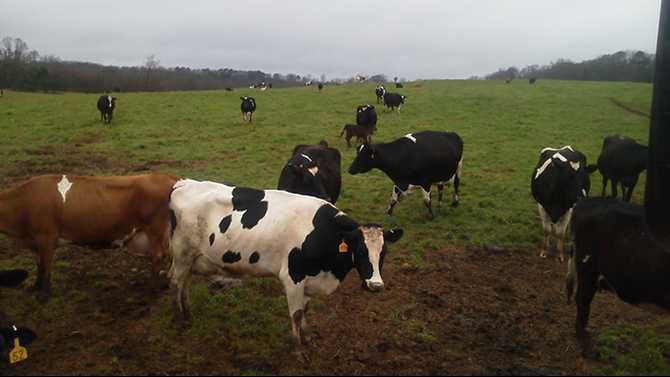How to apply for a tax exemption certificate
- Apply online at Agr.georgia.gov. The fee is $20.
- Apply via mail by sending the $25 fee and application form to the Georgia Department of Agriculture, P.O. Box 742304, Atlanta, GA 30374-2304. The application form can be downloaded at Agr.georgia.gov or picked up at a local farm bureau.
- Apply by phone by calling 1-855-FARM-TAX. The fee for an application over the phone is $25.
Source: Georgia Department of Agriculture
At more than $3 a gallon, buying 300 gallons of diesel fuel isn’t cheap, but it’s necessary for Scott Glover to run his dairy and creamery. After Jan. 1, the price tag for all that fuel — along with any other products used in production at Mountain Fresh Creamery and Glo-Crest Dairy in Clermont — will be tax exempt.
A state House bill passed by the legislature last year created the Georgia Agriculture Tax Exemption program, which allows approved agriculture producers to forgo paying sales tax on equipment and inputs for agricultural production. The exemptions also extend to equipment parts and energy used in production.
The program requires agricultural producers to submit an application and pay a fee to receive their tax exemption certificate, which must be presented to retailers to purchase products without being charged sales tax. An application and fee must be resubmitted each year. To be approved for the program, producers must have agricultural land from which $2,500 or more of agricultural products are made and sold each year. Producers also must fall under one of 52 agricultural industries ranging from poultry production to cotton ginning.
Mary Kathryn Yearta, chief communications officer for the Georgia Department of Agriculture, said at least 45,000 producers are estimated to be eligible for tax exemptions.
She said the new system allows for more organization, along with providing extra savings for agricultural producers.
“It kind of pulls all the ag(ricultural) exemptions into kind of one central place,” she said. “Plus, the economy’s still not in its best shape ever so anything we can kind of do to help local businesses stay competitive with other states is a good thing.”
Yearta said the department, which reviews applications, is making progress on spreading the word about the changes.
“What we don’t want to happen is a producer go into a store and find out they need a card to get their tax taken off,” she said.
An application can be completed electronically or submitted by mail. Yearta said local farm bureau offices also have applications for anyone needing one.
“More and more people have been signing up each day,” she said. “We do kind of have a ways to go, but the word is starting to get out.”
Georgia Poultry Federation President Mike Giles said the new program will aid poultry processors.
“Georgia poultry processors compete with poultry producers in other states and throughout the nation and world, he said. “So eliminating this sales tax on input will make our producers more competitive.
“They’re really pleased and looking forward to the savings.”
Giles said poultry growers have already enjoyed tax exemptions stemming from the 1980s so the only major change they’ll see is with the new certificate.
Glover, who has already submitted his application for a certificate, said he is glad to be saving some money.
“It used to (be) there were more tax breaks with this stuff and then they went away; now they’ve got it worked out to where we can be tax-exempt again and that’s a lot of savings,” he said. “Buying diesel fuel, we’ll save as much as $40 or $50 at a time — over the course of the year that’s a substantial.”
On top of the savings on fuel, Glover says he’ll be purchasing bottling equipment, hardware and other supplies tax-free.
“This’ll help us a lot,” he said. “It’ll save us a lot of money just on diesel fuel alone at the dairy.”
Glover also expects to see substantial savings on his power bill, and he plans to put all savings back into his operations.
“It takes an awful lot to run this, and this’ll just help us be able to do more,” he said.




